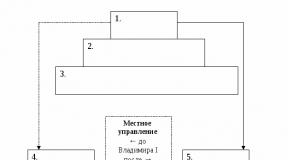Lease agreement: concept, main elements. Concepts and elements of a lease agreement 1 concept elements of the content of a lease agreement
Concept, types and general characteristics of a lease agreement
According to the lease agreement one party (the lessor) undertakes to provide the other party (the lessee) with property for a fee for temporary possession and use or for temporary use (see Article 606 of the Civil Code of the Russian Federation).
The lease agreement is consensual, compensated, mutual.
Legislation: Art. 606-625 of the Civil Code of the Russian Federation “General provisions on rent”.
Use refers to the extraction of useful properties from a thing without changing the substance of the thing, incl. acquisition of fruits and income. The right of use may also include the right to purchase this property (see Article 614 of the Civil Code of the Russian Federation). The tenant's right of use has the property of following the thing (see Article 617 of the Civil Code of the Russian Federation). The transfer of ownership of an item is not grounds for termination of the lease agreement.
When transferring property for use, the right of ownership to it remains with the transferring party. A person who receives property on lease acquires the rights to own and use it or only the right to use. In the first case, the property passes into the economic sphere of the tenant, in the second, it remains in the economic sphere of the lessor.
Since we are talking about temporary possession and (or) use, A lease agreement is always limited in duration - definite or indefinite.
Elements of the contract
Parties are any subjects of civil law.
Landlord- the owner of a thing is any person authorized by law or the owner to lease property.
Item- any bodily non-consumable thing, since it does not lose its properties during use, with the exception of things the rental of which is not allowed or limited by law.
Non-consumability- this is the quality of things that allows them not to lose their natural properties during use. The law does not specify how many times an item must be used before it can be considered non-consumable. Therefore, any thing that can be used more than once should be considered non-consumable.
Consumable items, i.e. those that are destroyed in one act of using them (food, fuel, etc.) cannot be rented out. The list of rental objects includes both real estate and movable property (Article 130 of the Civil Code). Man-made real estate includes buildings and structures, enterprises and some vehicles (see paragraph 2, paragraph 1, article 130 of the Civil Code). All other rental objects are classified as movable property. The specifics of leasing land plots are established by the Land Code of the Russian Federation.
The subject of the lease agreement is its essential condition
Article 607. Lease objects (extraction)
3. The lease agreement must contain data that makes it possible to definitely establish the property to be transferred to the lessee as the leased object. In the absence of this data in the contract, the condition regarding the object to be leased is considered not agreed upon by the parties, and the corresponding contract is not considered concluded.
The subject of a lease agreement is always an individually defined non-consumable thing.
Lease agreement form:
Lease agreement for a period of more than a year or with the participation of legal entities - a simple written form;
A real estate lease agreement is subject to state registration, unless otherwise provided by law (lease agreement for buildings, structures - for a period of at least a year - clause 2 of Article 65 i of the Civil Code of the Russian Federation);
A lease agreement providing for the subsequent transfer of ownership of this property to the lessee - in the form established for a purchase and sale agreement.
In derogation from the general rule enshrined in Art. 161 of the Civil Code, a lease agreement between citizens for a period of more than a year, regardless of the amount, must be concluded in simple written form.
a lease agreement for an amount exceeding 10 minimum wages must be concluded in simple written form, regardless of its term. In this case, the amount of the lease agreement should be considered the cost of the leased property or the amount of rent for the entire lease term, depending on whichever is greater.
For lease agreements involving legal entities, simple written form is required in all cases.
Clause 2 of Art. 609 establishes the mandatory state registration of a real estate lease agreement as a real estate transaction (clause 1 of Article 164 of the Civil Code). Registration of transactions with real estate is carried out in accordance with Art. 131 of the Civil Code and the Law on State Registration. According to Art. 1 of the said Law, a lease agreement is considered as a restriction (encumbrance) of the right to the relevant real estate. a real estate lease agreement is considered concluded, i.e., it gives rise to the rights and obligations of the parties from the moment of its state registration.
Contract price- is not an essential condition. The forms of rent are established by Art. 614 Civil Code of the Russian Federation.
Article 614. Rent (extraction)
2. The rent is established for all leased property as a whole or separately for each of its components in the form of:
1) payments determined in a fixed amount, made periodically or at a time;
2) the established share of products, fruits or income received as a result of the use of the leased property;
3) provision of certain services by the tenant;
4) transfer by the lessee to the lessor of the thing stipulated by the contract for ownership or lease;
5) assignment to the tenant of the costs stipulated by the contract for improving the leased property.
The parties may provide in the lease agreement for a combination of these forms of rent or other forms of rent payment.
3. Unless otherwise provided by the agreement, the amount of rent may be changed by agreement of the parties within the time limits provided for by the agreement, but not more than once a year. The law may provide for other minimum terms for reviewing the amount of rent for certain types of lease, as well as for the lease of certain types of property.
4. Unless otherwise provided by law, the tenant has the right to demand a corresponding reduction in the rent if, due to circumstances for which he is not responsible, the conditions of use provided for in the lease agreement or the condition of the property have significantly deteriorated.
5. Unless otherwise provided by the lease agreement, in the event of a significant violation by the tenant of the terms for payment of rent, the lessor has the right to demand from him early payment of rent within the period established by the lessor. In this case, the lessor has no right to demand early payment of rent for more than two consecutive terms.
Rent- this is a payment specifically for the ownership and (or) use of the leased property, and not for any additional services that the lessor may provide to the tenant. The amount, procedure, conditions and terms of payment of rent are established by the agreement.
If there is a delay in paying rent, the tenant is liable to the landlord in the form of compensation for losses, payment of interest under Article 395 of the Civil Code of the Russian Federation, as well as payment of a penalty if it is provided for in the lease agreement. The relationship between these measures of responsibility is established by the general rules provided for by the Civil Code.
The rent may be set for the entire leased property or separately for each of its component parts, depending on what provisions in this regard are contained in the agreement.
In the event that the rent is not agreed upon in relation to a unit of area or other indicator characterizing the size of the building (structure), a rule has been established that is used to determine the absolute value of the rent. To do this, you need to multiply the rental rate by the number of units of area contained in the building (structure) actually transferred to the tenant.
Duration of the lease agreement
A certain period. The law may provide for maximum (limit) periods for certain types of leases. A lease agreement concluded for a period exceeding the statutory deadline is considered concluded for a period equal to the maximum (clause 3 of Article 610 of the Civil Code of the Russian Federation). If the tenant continues to use the property after the expiration of the contract in the absence of objections from the lessor, the contract is considered renewed under the same conditions for an indefinite period (Article 610 of the Civil Code of the Russian Federation).
Indefinite term. In this case, either party has the right to withdraw from the agreement by notifying the other party 1 month in advance, and under a real estate lease agreement - 3 months, unless a different period is established by the agreement (clause 2 of Article 610 of the Civil Code of the Russian Federation).
Lessor's responsibilities:
Provide the property in a condition that complies with the terms of the lease agreement and the purpose of the property within the prescribed period (Article 611 of the Civil Code of the Russian Federation);
Warn the tenant about all rights of third parties to the leased property (Article 61Z of the Civil Code of the Russian Federation);
Carry out major repairs at your own expense (unless otherwise provided by the contract) - Art. 616 Civil Code of the Russian Federation;
Reimburse the tenant for the cost of inseparable improvements made with the consent of the landlord and at the expense of the tenant, unless otherwise provided by the lease agreement (Article 624 of the Civil Code of the Russian Federation).
Tenant's responsibilities:
Use the leased property in accordance with the terms of the lease agreement, and if such conditions are not specified in the agreement, in accordance with the purpose of the property (Article 615 of the Civil Code of the Russian Federation);
Pay fees for the use of property on time.
Peculiarities: The tenant may be given a pre-emptive right to enter into a lease for a new term.
The lessor is responsible for any defects in the leased property, regardless of whether they prevent the use of the property in whole or only in part. Responsibility does not apply only for those shortcomings that are named in paragraph 2 of Art. 612 Civil Code.
Sublease
The most common case of disposal of leased property is sublease. In sublease, the tenant becomes the lessor in relation to the subtenant, while at the same time retaining a certain amount of rental rights for himself. It is no coincidence that the rules on lease agreements apply to sublease agreements, unless otherwise provided by law or other legal acts.
A sublease agreement cannot be concluded for a period exceeding the term of the lease agreement. The sublessee cannot have more rights under the lease agreement.
As a general rule, the sublease agreement follows the fate of the lease agreement (clause 2 of Article 615 of the Civil Code of the Russian Federation). In particular, early termination of the lease agreement entails the termination of the sublease agreement concluded in accordance with it. A subtenant cannot acquire rights under a sublease if the tenant does not have rights under the lease.
If the tenant does not use the property in accordance with the terms of the lease agreement or the purpose of the property, the lessor has the right to demand early termination of the contract and compensation for losses (clause 3 of Article 615).
Article 621 of the Civil Code of the Russian Federation (extract)
1. Unless otherwise provided by law or the lease agreement, a tenant who has properly fulfilled his duties, upon expiration of the agreement, has, other things being equal, a preferential right over other persons to conclude a lease agreement for a new term. The tenant is obliged to notify the lessor in writing of his desire to conclude such an agreement within the period specified in the lease agreement, and if such a period is not specified in the agreement, within a reasonable time before the end of the agreement.
When concluding a lease agreement for a new term, the terms of the agreement may be changed by agreement of the parties.
If the lessor refuses to enter into an agreement with the lessee for a new term, but within a year from the date of expiration of the agreement with him has concluded a lease agreement with another person, the lessee has the right, at his own discretion, to demand in court the transfer of rights and obligations under the concluded agreement and compensation for losses, caused by the refusal to renew the lease agreement with him, or only compensation for such losses.
Improvement of leased property
Under improvements it is necessary to understand such changes in the leased property during the period of validity of the contract that increase its consumer properties and value.
There are improvements that are separable and not separable from the leased property, as well as those made with or without the consent of the lessor.
Separable improvements are recognized that can be separated from the thing without harm to it. Accordingly, inseparable improvements, when separated from a thing, worsen its condition, as a result of which it acquires defects.
Separable improvements to the leased property made by the tenant are recognized as his property, which he can dispose of at his own discretion. At the end of the lease, the severable improvements must be separated from the leased property.
Inseparable improvements are inextricably linked with the leased property, and therefore, as part of it, become the property of the lessor. However tenant, who made improvements at his own expense and with the consent of the lessor, has the right, after termination of the contract, to be reimbursed for the cost of these improvements.
Redemption of leased property
The law or the lease agreement may provide that the leased property becomes the property of the lessee upon expiration of the lease period or before its expiration, subject to the payment by the lessee of the entire purchase price stipulated by the agreement.
A lease agreement with the right to purchase is a mixed one, since it combines the features of purchase and sale and lease. If the condition for the purchase of the leased property is not provided for in the lease agreement, it may be established by an additional agreement of the parties, which has the right to agree to offset previously paid rent into the purchase price.
Types of lease agreement:
Rental agreement;
Vehicle rental agreement;
Lease agreement for buildings and structures;
Enterprise lease agreement;
Financial lease agreement (leasing).
Ø Possession and (or) use of property is temporary.
Ø The subject of the lease may be things are only individually determined.
Ø remunerative nature.
Ø consensual and mutual.
Ø K types of lease agreement The Civil Code of the Russian Federation includes contracts: rental(§2 Chapter 34 Civil Code), vehicle rental(§3 Chapter 34 Civil Code), rental of a building or structure(§4 Chapter 34 Civil Code), enterprise rental(§5 Chapter 34 Civil Code), finance lease(§6 Chapter 34 Civil Code). In addition to special types of leases, the Civil Code of the Russian Federation and other laws distinguish lease agreements for certain types of property (land plots, forest areas, etc.).
Ø Parties - landlord(landlord) and tenant(employer). The lessor has the right to be any individual or legal entity (including a foreign one) who has the title of both the owner of the property and the person authorized by law or the owner to lease the property.
Ø Subject of the lease agreement are things and other property, including property rights and obligations, exclusive rights to the results of intellectual activity. In this case, the subject of the lease agreement should be considered established if the content of the agreement allows one to definitely establish the property to be transferred as the object of lease. For this purpose, the contract must necessarily indicate data specifying the object: name of the property, inventory number, address, location, purpose, quality characteristics, etc.
Ø Contract form rent maybe written and oral. Lease agreements between legal entities and with citizens must be made in writing. For transactions between citizens, a written form is established only for transactions concluded for a period of more than a year.
Ø An important feature of the procedure for concluding a lease agreement is the tenant’s pre-emptive right to conclude an agreement for a new term.
Ø Rent is established for all leased property as a whole or separately for each of its component parts in the form of:
1) payments determined in a fixed amount, made periodically or at a time;
2) the established share of products, fruits and income received as a result of the use of leased property;
3) provision of certain services by the tenant;
4) transfer by the lessee to the lessor of the thing stipulated by the contract for ownership or lease;
5) imposing on the tenant the costs stipulated by the contract for improving the leased property (Article 614 of the Civil Code of the Russian Federation).
Ø Term - can be concluded as definite, and on uncertain term. Leases for up to one year are considered short-term. If a lease agreement is concluded without specifying a term, it is considered to be concluded for an indefinite period.
Ø Main landlord's duty consists of providing the property stipulated by the contract to the tenant. In this case, the lessor is obliged to provide the tenant with property in a condition consistent with the terms of the lease agreement and the purpose of the property. The property is leased together with all its accessories and related documents (technical passport, quality certificate, etc.) (Article 611 of the Civil Code of the Russian Federation).
Ø One of the main tenant's responsibilities consists of using the leased property in accordance with the terms of the agreement, and if such are not specified in the agreement, then in accordance with the purpose of the property. In the process of using the leased property, the lessee, with the consent of the lessor, has the right to dispose of it to a limited extent, including: sublease (sublease) of the leased property and the transfer by the lessee of his rights and obligations to another person under a release agreement; providing leased property for free use, as well as pledging rental rights and making them as a contribution to the authorized capital of business partnerships and societies or a share contribution to a production cooperative. In these cases, with the exception of re-tenancy, the tenant remains liable under the agreement to the lessor (Article 615 of the Civil Code of the Russian Federation).
Article 606. Lease agreement
The fruits, products and income received by the lessee as a result of the use of the leased property in accordance with the agreement are his property.
Article 607. Lease objects
1. Land plots and other isolated natural objects, enterprises and other property complexes, buildings, structures, equipment, vehicles and other things that do not lose their natural properties during their use (non-consumable things) can be leased.
The law may establish types of property the rental of which is prohibited or limited.
2. The law may establish the specifics of leasing land plots and other isolated natural objects.
3. The lease agreement must contain data that makes it possible to definitely establish the property to be transferred to the lessee as the leased object. In the absence of this data in the contract, the condition regarding the object to be leased is considered not agreed upon by the parties, and the corresponding contract is not considered concluded.
Article 608. Lessor
Article 609. Form and state registration of the lease agreement
Article 610. Term of the lease agreement
Article 611. Provision of property to the tenant
Article 612. Lessor’s liability for defects in leased property
Article 613. Rights of third parties to leased property
Article 614. Rent
KINDS:
Rental agreement, Rental of vehicles, Rental of buildings and structures, Rental of enterprises, Financial lease (leasing), Rental agreement for residential premises
14. Lease agreement. Under a lease (property lease) agreement, the lessor (lessor) undertakes to provide the lessee (tenant) with property for a fee for temporary possession and use or for temporary use. 15. Leasing agreement. Under a leasing agreement, the lessor undertakes to acquire ownership of the property specified by the lessee from a seller identified by him and to provide the lessee with this property for a fee for temporary possession and use for business purposes. 16.Rental agreement. Only non-consumable items can be leased objects, i.e. those whose properties do not change during their use. The form is predominantly written, because one of the parties is always a legal entity. Rental – movable property, usually for household purposes. Duration – up to 1 year. This is a public contract (i.e. anyone who wants it cannot be refused). 17. Enterprise lease agreement 1. Under a lease agreement for an enterprise as a whole as a property complex used for business activities, the lessor undertakes to provide the lessee for a fee for temporary possession and use of everything that is the enterprise and belongs to it.2. The rights of the lessor, obtained by him on the basis of a permit (license) to engage in the relevant activity, are not subject to transfer to the lessee. 18. Residential rental agreement 1. Under a residential lease agreement, one party - the owner of the residential premises or a person authorized by him (lessor) - undertakes to provide the other party (tenant) with residential premises for a fee for possession and use for living in it.2. Legal entities may be provided with possession and (or) use of residential premises on the basis of a lease or other agreement. A legal entity may use residential premises only for the residence of citizens. SHORT-TERM - up to one year, LONG-TERM - up to five years (Article 683).CONTRACT CONTRACT: CONCEPT, ELEMENTS, EXECUTION. TYPES OF CONTRACTS.
100 RUR bonus for first order
Select the type of work Diploma work Course work Abstract Master's thesis Practice report Article Report Review Test work Monograph Problem solving Business plan Answers to questions Creative work Essay Drawing Essays Translation Presentations Typing Other Increasing the uniqueness of the text Master's thesis Laboratory work On-line help
Find out the price
A lease agreement (property lease) is one of the most common agreements. It is defined in Art. 606 of the Civil Code as an obligation under which the lessor undertakes to provide the lessee with property for a fee for temporary possession and use or for temporary use. In the legislative definition of this agreement, as in other legal norms, the terms “lease” and “property lease” are used as identical.
The focus of the lease agreement on the transfer of property for temporary use is the main feature that distinguishes leases in the system of civil contracts. This feature makes it possible to distinguish a lease agreement from obligations that have a different focus (transfer of property into ownership, performance of work, provision of services).
The lessee, as a rule, is given not only the right to use (i.e., to extract its useful properties from a thing), but also the right of ownership (actual possession) of the leased property. Giving the tenant the status of title owner allows him to use proprietary methods of protection against attacks by third parties (Article 305 of the Civil Code). However, legal relationships are possible in which the lessor transfers only the right of use to the lessee, while retaining the right of ownership. For example, when leasing sophisticated electronic equipment, the lessee may have the right to use it without actually owning it.
The basis for legislative regulation of rental relations is the Civil Code of the Russian Federation, where Chapter is devoted to them. 34 (art. 606-670). Of great importance for the regulation of lease legal relations are the general provisions of the law of obligations and contractual law contained in Section. III part 1 of the Civil Code. They apply to rent insofar as they do not contradict its specifics and rules about it.
Special rules devoted to the peculiarities of certain types of lease, as well as the lease of certain types of property, are provided for in a number of other legislative acts. Legal relations related to the lease of land plots are regulated by the Land Code and the Federal Law of July 24, 2002 “On the turnover of agricultural land.” Air Code, KTM and KVVT along with § 3 Ch. 34 of the Civil Code contain the legal regulation of vehicle rental. The Leasing Law provides for special regulation of leasing legal relations. The rules of the Law on the Protection of Consumer Rights apply to relationships in which the tenant acts as a consumer. For extensive judicial interpretation of tenancy law, see the Tenancy Dispute Resolution Review.
The lease agreement is consensual, mutual and compensated.
The parties to the agreement are landlord and tenant, which can be both individuals and legal entities. Commercial and non-profit organizations, as well as the Russian Federation, its constituent entities and municipalities can participate as legal entities in lease legal relations. For certain types of lease agreements and certain types of property, additional requirements have been established that the parties to the agreement must meet (in particular, for lease agreements of state and municipal property).
Renting out property is an act of disposing of it, i.e. implementation of one of the main rights of the owner. Therefore, as landlord may be the owner or another person authorized by law or the owner to lease property (Article 608 of the Civil Code). When considering disputes arising from the execution of lease agreements, courts proceed from the presumption that the agreement was concluded by the legal lessor (owner or duly authorized person), until otherwise proven. If the agreement is signed by an improper lessor, this is grounds for declaring it invalid (void).
The right to transfer state property for temporary use is within the competence of executive authorities. Based on Art. 114 of the Constitution of the Russian Federation The Government of the Russian Federation determines the procedure for leasing federal property. In accordance with the Decree of the President of the Russian Federation of May 17, 2008 “On the system and structure of executive authorities” and the Decree of the Government of the Russian Federation dated November 27, 2008 No. 691 “On the Federal Agency for the Management of Federal Property”, these powers were transferred to the Federal Agency for the Management of Federal Property property and its territorial administrations. Thus, the lessor of federal state property that is not assigned to a legal entity by property right can only be the corresponding state executive body vested with the relevant powers by the Government of the Russian Federation. Features of the lease of property of constituent entities of the Russian Federation and municipalities may be provided for by regional legislation.
The law also provides for some features of the disposal of property assigned by property right to state and municipal legal entities. Thus, a state or municipal enterprise, to which the property belongs under the right of economic management, has the right to lease movable property independently, and real estate - only with the consent of the owner represented by the authorized executive body (Article 295 of the Civil Code). A state-owned enterprise, endowed with property with the right of operational management, can act as a lessor only with the consent of the owner (Article 297 of the Civil Code). Budgetary institutions, as a general rule, do not have the right to rent out the property assigned to them. Only an authorized state body can act as a lessor of such property. But if, in accordance with the constituent documents, the institution is granted the right to carry out income-generating activities, then it has the right to act as a lessor in relation to property acquired from these incomes (Article 298 of the Civil Code).
Lease agreements that do not contain buyout provisions are not subject to the provisions of Art. 78, 79 of the Law on Joint Stock Companies and Art. 46 of the Law on Limited Liability Companies, which regulate the procedure for concluding major transactions by a company, since these rules apply only to transactions aimed at alienating property. At the same time Art. 78 of the Law on Joint Stock Companies gives the company the right to extend a special procedure for concluding large transactions to lease agreements and, thus, limit the powers of its bodies and representatives.
Tenant can be any subject of civil law with legal capacity. Exception amounts to rental of property with limited turnover. To obtain such property for rent, you must have a license to engage in the relevant activity or meet other requirements provided for by law.
Rental object . Can be rented out material objects that do not lose their natural properties during their use(land plots and other isolated natural objects, enterprises and other property complexes, buildings, structures, vehicles, household property, etc.). The non-consumable nature of the leased object is associated with the legal nature of this agreement, which provides for the obligation of the tenant to return the same property at the end of the lease. Therefore, from the list of possible rental objects, property is excluded that, by its nature, cannot but be consumed in the process of using it in civil circulation (for example, money). Property rights are also not transferred to the lease.
The legislator has the right to determine the types of property the rental of which is not allowed or limited (Article 607 of the Civil Code). Lease objects cannot be things withdrawn from circulation. Items with limited circulation can be leased only in compliance with the established restrictions. For some types of lease, the range of possible objects is also limited, for example, according to Art. 666 of the Civil Code, the subject of a leasing agreement (financial lease) cannot be land plots and other natural objects.
The legislator has provided in special acts additional requirements for concluding lease agreements for natural objects. Subsoil plots may be provided for use only on the basis of a decision of the authorized state body (Articles 10.1, 11 of the Subsoil Law). Forest fund areas must be leased based on the results of forest competitions (Article 34 of the Forest Code). Peculiarities of land lease are regulated in the norms of Chapter. 17 Civil Code and ch. 4 of the Land Code.
The lease agreement must contain data that makes it possible to definitely identify the property to be transferred to the tenant. In the absence of this data in the agreement, the condition regarding the object to be leased is considered not agreed upon, and the corresponding lease agreement is considered not concluded (clause 3 of Article 607 of the Civil Code).
The item being leased must be legally irreplaceable , because at the end of the contract the same thing is subject to return. Things defined by generic characteristics cannot be the subject of a lease agreement, since they are legally replaceable.
Conclusion: 1) individually determined; 2) non-consumable; 3) legally irreplaceable.
Rental period. As a rule, a lease agreement is concluded for a period determined by agreement of the parties. However, for certain types of lease, as well as for the lease of certain types of property, the law may establish maximum (limit) periods. In these cases, the parties are not entitled to exceed this deadline. So, according to Art. 627 of the Civil Code, a rental agreement is concluded for a period of up to one year. Lease periods are set for natural objects. For example, the period for which water bodies are provided for use cannot be more than 20 years (Article 14 of the Water Code); The maximum lease period for forest areas is 99 years (Article 31 of the Forest Code). A lease agreement concluded for a period exceeding the legal limit is considered to be concluded for a period equal to the limit. If the agreement, for which a deadline is established by law, does not indicate the rental period and neither party renounced the agreement before the expiration of the deadline, the agreement is terminated upon expiration of the deadline (clause 3 of Article 610 of the Civil Code).
As a general rule, the rental period is not an essential term of the contract. If the term is not specified in the contract, it is considered to be concluded for an indefinite period. At the same time, for certain types of lease agreements, the term is an essential condition. Consequently, failure to agree on it between the parties entails recognition of the contract as not concluded (Article 432 of the Civil Code). In particular, the term is an essential condition of the lease agreement for a forest area (Article 33 of the Forest Code).
If the lease agreement is concluded for an indefinite period, each party has the right to cancel the agreement at any time by notifying the other party in advance. To ensure the stability of the property status of participants in a lease obligation, the legislator has established a sufficiently long warning period. In a regular lease, notice of cancellation of the contract must be given at least one month in advance, and in the case of renting real estate - at least 3 months in advance (Article 610 of the Civil Code). At the same time, a different warning period may be established by law or agreement. For example, a tenant under a rental agreement concluded for an indefinite period has the right to cancel the agreement by notifying the lessor at least 10 days in advance (clause 3 of Article 627 of the Civil Code).
If the tenant continues to use the property after the expiration of the contract in the absence of objections from the lessor, the contract is considered renewed on the same terms for an indefinite period (clause 2 of Article 621 of the Civil Code). Each of the parties to a contract renewed in this way has the right to cancel it by warning the other party one month in advance, and when renting real estate - 3 months in advance (Article 610 of the Civil Code). The rules on the renewal of a lease agreement for an indefinite period do not apply to a rental agreement (clause 2 of Article 627 of the Civil Code) and to the rental of vehicles (Articles 632 and 642 of the Civil Code).
Form and state registration of the lease agreement. Lease agreements can be concluded orally or in writing. However, oral form is allowed only for contracts between citizens for a lease period of no more than a year (clause 1 of Article 609 of the Civil Code). For some types of lease agreements, the law establishes a mandatory written form, regardless of the subject composition and lease term (for example, rental - Article 626 of the Civil Code, lease of vehicles - Articles 633 and 643 of the Civil Code, lease of buildings or structures - Article 651 of the Civil Code, lease of enterprises - Art. 658 Civil Code).
Failure to comply with the simple written form established by law entails the invalidity of the lease agreement only in cases expressly specified in the law or agreement (clause 2 of Article 162 of the Civil Code). Such consequences are established for the lease of buildings or structures (Article 651 of the Civil Code) and the lease of enterprises (Article 658 of the Civil Code). In other cases, failure to comply with a simple written form only deprives the parties of the right in the event of a dispute to refer to witness testimony to confirm the contract and its terms (clause 1 of Article 162 of the Civil Code). The particular importance of lease agreements for buildings (structures) and enterprises necessitated the introduction of a rule that such agreements should be concluded not just in writing, but by drawing up and signing by the parties one document (Articles 651 and 658 of the Civil Code).
A real estate lease agreement is subject to state registration, unless otherwise provided by law (clause 2 of Article 609 of the Civil Code). “Other” is provided, in particular, by Art. 633 and 643 of the Civil Code, from which it follows that lease agreements for vehicles, including those that are real estate (aircraft, sea vessels, inland navigation vessels), should not undergo state registration. In addition, according to Art. 651 of the Civil Code, lease agreements for buildings and structures are subject to registration only if they are concluded for a period of at least one year. The procedure for state registration is determined by the Law on State Registration of Rights to Real Estate. The registration record is entered into the Unified State Register of Rights to Real Estate and Transactions with It, the rules for maintaining which are approved by Decree of the Government of the Russian Federation of February 18, 1998 No. 219. Additional special rules have been established for the state registration of lease agreements for certain objects.
Failure to comply with the requirement for state registration of a transaction entails its invalidity in cases established by law (Article 165 of the Civil Code). Such consequences are provided for by the legislator, in particular, for lease agreements for buildings (structures) and enterprises (Articles 651 and 658 of the Civil Code). If a transaction requiring state registration is completed in the proper form, but one of the parties avoids registering it, the court has the right, at the request of the other party, to make a decision to register the transaction (Article 165 of the Civil Code).
The lease agreement, which subsequently provides for the transfer of ownership of the leased property to the lessee, is concluded in the form established for the purchase and sale agreement of such property (clause 3 of Article 609 of the Civil Code). This rule regulates only the form of the agreement and therefore does not provide grounds for applying other conditions governing the purchase and sale to the lease agreement. In addition, paragraph 3 of Art. 609 of the Civil Code must be considered as a rule establishing additional requirements for the form of a lease agreement with the right to buy, and not repealing those requirements established by the legislator for a regular lease.
Under a lease agreement (property lease) lessor (tenant) undertakes to provide tenant (tenant) property for a fee for temporary possession and use or temporary use.
The fruits, products and income received by the lessee as a result of the use of the leased property in accordance with the agreement are his property.
Lease contract- bilaterally binding, consensual, compensated. Its parties are the lessor and the lessee.
Acts as a lessor owner leased property, however, lessors can also be persons authorized by law or the owner to lease property. For example, by virtue of the law, subjects of economic management rights have such a right: state and municipal unitary enterprises. However, in relation to real estate, this right is limited by the need to obtain the consent of the property owner.
Subject (object) lease agreements can be land plots and other isolated natural objects, enterprises and other property complexes, buildings, structures, equipment, vehicles and other things that do not lose their natural properties during their use (non-consumable things) and are not excluded from civil turnover.
Form: always in writing. If the contract term exceeds 1 year, then the contract is subject to state registration. If one of the parties is a legal entity. person, then the agreement is in writing and must be subject to state registration.
Rental period determined by agreement of the parties (dispositive method): for a definite or indefinite period (if the period is not specified). The lease term is established as a specific calendar period during which the tenant continuously possesses and uses the property. At the same time, there are cases when the parties provide for the transfer of property into possession and use at a time determined by a special schedule. Such agreements must indicate the total duration of the agreement and periods of use of the property (for example, a gym, swimming pool, computer, etc.).
An important condition of the lease agreement is rent- payments made by the tenant to the landlord for the use of the property. The Civil Code of the Russian Federation does not classify this condition as essential. The only exception is lease agreements for buildings and structures, for which the condition on the amount of rent is mandatory.
The rent is established for all leased property as a whole or separately for each of its component parts in the form of:
1) payments determined in a fixed monetary amount, made periodically or at a time;
2) the established share of products, fruits or income received as a result of the use of the leased property;
3) provision of certain services by the tenant;
4) transfer by the lessee to the lessor of the thing stipulated by the contract for ownership or lease;
5) assignment to the tenant of the costs stipulated by the contract for improving the leased property.
The parties may provide in the lease agreement for a combination of these forms of rent or other forms of rent payment.



















